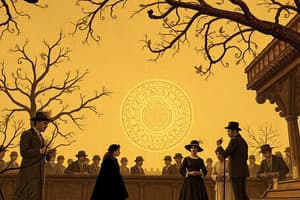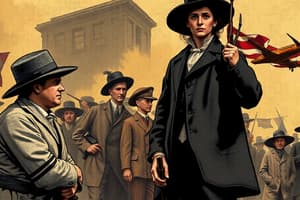Podcast
Questions and Answers
What were muckrakers and what goals did they pursue during the Progressive Era?
What were muckrakers and what goals did they pursue during the Progressive Era?
Muckrakers were journalists who exposed corruption and social injustices. Their goal was to inform the public and advocate for societal reforms.
Identify two notable muckrakers and summarize their contributions.
Identify two notable muckrakers and summarize their contributions.
Upton Sinclair authored The Jungle, which highlighted unsanitary conditions in the meatpacking industry, while Ida Tarbell investigated the monopolistic practices of Standard Oil.
How did muckrakers influence public policy and reforms?
How did muckrakers influence public policy and reforms?
Muckrakers influenced public policy by exposing abuses and injustices, leading to reforms like the Pure Food and Drug Act and strengthened antitrust laws.
What was Hull House and what legacy did it leave in the context of social reform?
What was Hull House and what legacy did it leave in the context of social reform?
Describe the Social Gospel movement and its primary focus.
Describe the Social Gospel movement and its primary focus.
What was the significance of the Muller v. Oregon case in terms of women's labor rights?
What was the significance of the Muller v. Oregon case in terms of women's labor rights?
Outline the main goals of the Prohibition era and its eventual outcome.
Outline the main goals of the Prohibition era and its eventual outcome.
How did Theodore Roosevelt and Woodrow Wilson approach antitrust efforts during their presidencies?
How did Theodore Roosevelt and Woodrow Wilson approach antitrust efforts during their presidencies?
What was the primary focus of the Social Gospel movement?
What was the primary focus of the Social Gospel movement?
How did the Social Gospel movement impact Progressive reforms?
How did the Social Gospel movement impact Progressive reforms?
Name one significant reform associated with the Social Gospel.
Name one significant reform associated with the Social Gospel.
Summarize the decision made in Muller v. Oregon.
Summarize the decision made in Muller v. Oregon.
What was the ruling in Lochner v. New York and its significance?
What was the ruling in Lochner v. New York and its significance?
How did Muller v. Oregon reflect Progressive priorities?
How did Muller v. Oregon reflect Progressive priorities?
Discuss the impact of Lochner v. New York on labor reform efforts.
Discuss the impact of Lochner v. New York on labor reform efforts.
What approach did Theodore Roosevelt take toward monopolies?
What approach did Theodore Roosevelt take toward monopolies?
How did Woodrow Wilson's stance on monopolies differ from Roosevelt's?
How did Woodrow Wilson's stance on monopolies differ from Roosevelt's?
What was a key outcome of Roosevelt's antitrust efforts?
What was a key outcome of Roosevelt's antitrust efforts?
What legislation resulted from Wilson’s antitrust policies?
What legislation resulted from Wilson’s antitrust policies?
How did Muckrakers contribute to Progressive reforms?
How did Muckrakers contribute to Progressive reforms?
In what way did the Progressive Era illustrate tensions between individual liberty and government intervention?
In what way did the Progressive Era illustrate tensions between individual liberty and government intervention?
What role did women reformers play in the Progressive Era?
What role did women reformers play in the Progressive Era?
Discuss the broader implications of the Progressive reforms for social justice.
Discuss the broader implications of the Progressive reforms for social justice.
Flashcards
Muckrakers
Muckrakers
Journalists who exposed corruption and social injustices in government and industry. They aimed to inform the public and push for reforms.
Hull House
Hull House
A settlement house founded by Jane Addams in 1889. It provided education, childcare, and cultural activities for immigrants. The Hull House was a pioneer in social work and advocated for urban poverty reform.
Social Gospel
Social Gospel
A religious movement that focused on improving society through Christian principles. They advocated for labor rights, education, and social justice.
Muller v. Oregon
Muller v. Oregon
Signup and view all the flashcards
Prohibition
Prohibition
Signup and view all the flashcards
Mann Act
Mann Act
Signup and view all the flashcards
John Dewey
John Dewey
Signup and view all the flashcards
Lochner v. New York
Lochner v. New York
Signup and view all the flashcards
Antitrust Efforts
Antitrust Efforts
Signup and view all the flashcards
Conservation Movement
Conservation Movement
Signup and view all the flashcards
How did the Social Gospel influence Progressive reforms?
How did the Social Gospel influence Progressive reforms?
Signup and view all the flashcards
Key reform linked to the Social Gospel
Key reform linked to the Social Gospel
Signup and view all the flashcards
Summarize Muller v.Oregon & Lochner v.New York
Summarize Muller v.Oregon & Lochner v.New York
Signup and view all the flashcards
How did Muller & Lochner reflect Progressive priorities?
How did Muller & Lochner reflect Progressive priorities?
Signup and view all the flashcards
Broader implications of Muller & Lochner
Broader implications of Muller & Lochner
Signup and view all the flashcards
Theodore Roosevelt & Woodrow Wilson on monopolies
Theodore Roosevelt & Woodrow Wilson on monopolies
Signup and view all the flashcards
How did Roosevelt & Wilson reflect Progressive values?
How did Roosevelt & Wilson reflect Progressive values?
Signup and view all the flashcards
Outcomes of Roosevelt & Wilson's efforts
Outcomes of Roosevelt & Wilson's efforts
Signup and view all the flashcards
How did Progressive reforms address industrialization challenges?
How did Progressive reforms address industrialization challenges?
Signup and view all the flashcards
Social Gospel & settlement houses' role
Social Gospel & settlement houses' role
Signup and view all the flashcards
How did Progressive reforms improve working conditions?
How did Progressive reforms improve working conditions?
Signup and view all the flashcards
Progressive Era tensions between liberty & intervention
Progressive Era tensions between liberty & intervention
Signup and view all the flashcards
Antitrust laws: individual liberty vs. intervention
Antitrust laws: individual liberty vs. intervention
Signup and view all the flashcards
Morality vs. personal freedoms in Progressive Era
Morality vs. personal freedoms in Progressive Era
Signup and view all the flashcards
Study Notes
Muckrakers
- Journalists who exposed corruption and social injustices in the Progressive Era.
- Included notable figures like Upton Sinclair (The Jungle) and Ida Tarbell (Standard Oil).
- Their work led to significant reforms, such as food safety laws.
Jane Addams & Hull House
- Hull House, founded in 1889, offered support to immigrants through education, childcare, and cultural activities.
- Jane Addams' legacy is one of pioneering social work and advocating for urban poverty reform.
Social Gospel
- A religious movement that aimed to improve society through Christian principles by addressing poverty, labor rights, and public health.
- Key reformers emphasized Christian ethics to drive social change.
Muller v. Oregon (1908)
- Upheld limits on women's working hours, citing health concerns, however, it also reinforced gender stereotypes in the labor market.
Prohibition
- Banned alcohol from 1920 to 1933.
- Led to organized crime and was ultimately repealed by the 21st Amendment.
Mann Act (1910)
- Initially intended to fight human trafficking, but often showed racial and class bias in enforcement.
John Dewey
- Championed progressive education and critical thinking.
Lochner v. New York (1905)
- Struck down laws that limited bakers' working hours, primarily focusing on the idea of "liberty of contract".
Antitrust Efforts
- Theodore Roosevelt strengthened antitrust laws and championed public control over industry consolidation.
- Woodrow Wilson opposed monopolies, focusing on promoting fair competition in the market.
Conservation Movement
- Promoted responsible natural resource management, including the Hetch Hetchy debate.
Progressive Era Reforms: Addressing Industrial Challenges
- Muckrakers exposed industrial exploitation; resulting in reforms such as the Meat Inspection Act.
- Social reformers worked directly with the poor and immigrants, e.g., Hull House.
- Labor reforms improved conditions.
- Key Progressive Era laws addressed issues like child labor and women's working hours.
Progressive Era Tensions: Individual Liberty vs. Intervention
- Cases like Lochner v. New York prioritized individual liberty over government regulation of labor.
- Conversely Muller v. Oregon supported government intervention for issues of women's health and well-being.
- Progressive-era reforms often balanced individual rights against societal needs.
Progressive Reforms: Moral and Ethical Influences
- The Social Gospel influenced reforms, driving change through ethical principles and religious values.
- Women reformers played a significant role like Jane Addams, pushing for broader social and labor laws.
- The push for prohibition and other laws reflected broader moral values of the time.
Progressive Era Reforms: Social Justice and Equality
- Progressive Era reforms showed successes and limitations. Settlement houses improved urban life and addressed poverty.
- However, racial inequalities persisted. While there were efforts to improve standards, these issues were not completely addressed.
Progressive Leadership and Movement Approaches
- Theodore Roosevelt focused on regulating industry and preserving nature.
- Woodrow Wilson emphasized banking and tariff reforms and did not prioritize the plight of social reformers while focusing on economic inequality.
- Ground-level reformers like Jane Addams and investigative journalists (muckrakers) targeted specific societal problems directly.
Progressive Era Legal Decisions: Gender and Labor
- Muller v. Oregon justified legislation to regulate women's working hours while cementing gendered stereotypes in the workforce.
- Lochner focused on individual contract rights, which resulted in laws aimed at protecting worker labor being overturned.
Studying That Suits You
Use AI to generate personalized quizzes and flashcards to suit your learning preferences.




